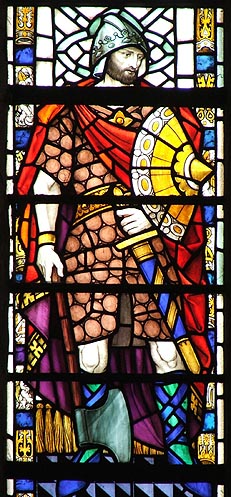Who by the mouth of our father David . . .

The stained-glass window depicts King Athelstan the Glorious.
Acts 4: 23-31
“And when they heard it, they lifted their voices together to God and said,
God Is Addressed
Sovereign Lord, who didst make the heaven and the earth and the sea and everything in them, who by the mouth of our father David, thy servant, didst say by the Holy Spirit,
The Psalm Quoted: Meditatio
`Why did the Gentiles rage,and the peoples imagine vain things? The kings of the earth set themselves in array, and the rulers were gathered together, against the Lord and against his Anointed’ —
Historical Fulfillment of David’s Prophecy
for truly in this city there were gathered together against thy holy servant Jesus, whom thou didst anoint, both Herod and Pontius Pilate, with the Gentiles and the peoples of Israel, to do whatever thy hand and thy plan had predestined to take place.
The Petition: Oratio
And now, Lord, look upon their threats, and grant to thy servants to speak thy word with all boldness, while thou stretchest out thy hand to heal, and signs and wonders are performed through the name of thy holy servant Jesus.
God’s Response: An Outpouring of the Holy Spirit
And when they had prayed, the place in which they were gathered together was shaken; and they were all filled with the Holy Spirit and spoke the word of God with boldness.”
Praying Out of a Psalm
Today’s First Reading at Holy Mass gave us the earliest example of an Oration or Collect based on a psalm. Already in the first centuries of the Church, authorized by the teaching of Our Lord Himself in Luke 24:44-45, the faithful began to recognize Christ and His Mysteries in the psalms they were accustomed to chant. A Trinitarian doxology (Gloria Patri) came to be appended to each psalm, and before long the psalms were enriched with refrains or framed with antiphons.
Collects on the Psalms
In both East and West, it was not uncommon to rise, or kneel, or prostrate, and pray in silence at the end of a psalm. The priest officiating would then gather up (colligere) the silent supplications of the faithful, and express them in an Oration or Collect recited in the name of all. Egeria, writing in about 415 A.D., Cassian, writing in about 420 A.D., and the 6th century Rule of the Master, all attest to the existence of this custom both in urban churches and in monastic assemblies.
The custom of inserting Collects into the psalmody of the Divine Office did not survive the test of time. It seems to have disappeared quite early in the East, and Saint Benedict, so careful to note the details of monastic psalmody in the West, makes no mention of Collects on the psalms.
Even while Collects on the psalms fell out of public liturgical use, they continued to be popular through the Middle Ages in personal devotions. Thus, one finds them in various Psalters for personal use and Books of Hours.
The Orations at the Paschal Vigil
The only place where Collects on the psalms survive in the actual liturgical practice of the Roman Rite is in the orations that, at the Paschal Vigil, conclude each of the Tracts or Responsorial Psalms that follow the readings. The Collect, of course, follows the repetition of the antiphon (or refrain) and never comes between the psalm and the repetition of the antiphon.
A Stupid Editorial Mistake
Some forty years ago the editors of the American edition of the Liturgia Horarum included Collects on the psalms in their books. The editors in question appear to have had no experience whatsoever of the choral celebration of the Divine Office. Consequently, with a total disregard for the musical and theological function of the antiphon — to indicate the mode of the psalmody, and to serve as a Christological and ecclesiological key to it — they wrongly inserted the “Psalm Prayers” between the doxology and the repetition of the antiphon. Musically, this is a disaster.
Doing It Right
I would argue that the last thing one needs in liturgical prayer is more wordiness, and the “Psalm Prayers” often give the impression of adding words for the sake of pious bulk. If, however, one judges the inclusion of Collects on the psalms of some pastoral benefit in the public celebration of the Liturgy of the Hours, one should model the practice after what is done at the Paschal Vigil:
1) After the final repetition of the antiphon, all rise.
2) The celebrant sings, “Let us pray.”
3) After a pause, he sings the Collect, taking care to conclude it using the shorter ending: “Through Christ our Lord,” or “Who live and reign forever and ever.”
4) The people respond “Amen.”
Here is the psalm Collect given for the same Psalm 2 in the prayerbook of Athelstan, King of England from 924 to 939:
O Lord, we beseech Thee,
break the chains of our sins;
so that, bound to the yoke of Thy service,
we may be able to serve Thee in fear and reverence.
Through Christ our Lord.
And here is a Collect I composed to conclude today’s General Intercessions:
Almighty and ever-living God
who on Sion your holy mountain
established your Christ as King,
mercifully grant that we may spurn
the insurrection of sinful passions,
so as to stand with humble confidence on the last day
before the Judge of all,
the Lord of clemency,
the Prince of Peace,
who is Lord forever and ever.
